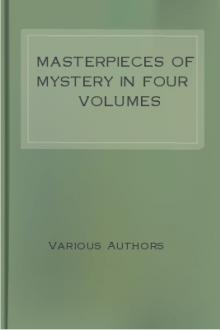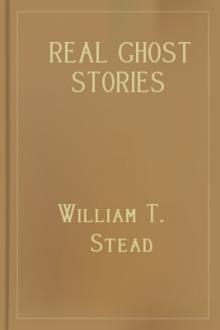Varney the Vampire; Or, the Feast of Blood by Prest and Rymer (ereader iphone .txt) 📗

- Author: Prest and Rymer
Book online «Varney the Vampire; Or, the Feast of Blood by Prest and Rymer (ereader iphone .txt) 📗». Author Prest and Rymer
"You object?"—"I do to the former of your propositions, but not to the latter. I will promise not to go at all out of my way to execute any vengeance upon you; but I will not promise that I will not communicate the circumstances of my forced absence from them, to those friends whose opinion I so much value, and to return to whom is almost as dear to me as liberty itself."
Sir Francis Varney was silent for a few moments, and then he said, in a tone of deep solemnity,—
"There are ninety-nine persons out of a hundred who would take your life for the independence of your tongue; but I am as the hundredth one, who looks with a benevolent eye at your proceedings. Will you promise me, if I remove the fetters which now bind your limbs, that you will make no personal attack upon me; for I am weary of personal contention, and I have no disposition to endure it. Will you make me this promise?"—"I promise?"—"I will."
Without another word, but trusting implicitly to the promise which had been given to him, Sir Francis Varney produced a small key from his pocket, and unlocked with it a padlock which confined the chains about the prisoner.
With ease, Charles Holland was then enabled to shake them off, and then, for the first time, for some weeks, he rose to his feet, and felt all the exquisite relief of being comparatively free from bondage.
"This is delightful, indeed," he said.
"It is," said Sir Francis Varney—"it is but a foretaste of the happiness you will enjoy when you are entirely free. You see that I have trusted you."
"You have trusted me as you might trust me, and you perceive that I have kept my word."
"You have; and since you decline to make me the promise which I would fain have from you, to the effect that you would not mention me as one of the authors of your calamity, I must trust to your honour not to attempt revenge for what you have suffered."
"That I will promise. There can be but little difficulty to any generous mind in giving up such a feeling. In consequence of your sparing me what you might still further have inflicted, I will let the past rest, and as if it had never happened really to me; and speak of it to others, but as a circumstance which I wish not to revert to, but prefer should be buried in oblivion."
"It is well; and now I have a request to make of you, which, perhaps, you will consider the hardest of all."
"Name it. I feel myself bound to a considerable extent to comply with whatever you may demand of me, that is not contrary to honourable principle."
"Then it is this, that, comparatively free as you are, and in a condition, as you are, to assert your own freedom, you will not do so hastily, or for a considerable period; in fact, I wish and expect that you should wait yet awhile, until it shall suit me to say that it is my pleasure that you shall be free."
"That is, indeed, a hard condition to man who feels, as you yourself remark, that he can assert his freedom. It is one which I have still a hope you will not persevere in.
"Nay, young man, I think that I have treated you with generosity, to make you feel that I am not the worst of foes you could have had. All I require of you is, that you should wait here for about an hour. It is now nearly one o'clock; will you wait until you hear it strike two before you actually make a movement to leave this place?"
Charles Holland hesitated for some moments, and then he said,—
"Do not fancy that I am not one who appreciates the singular trust you have reposed in me; and, however repugnant to me it may be to remain here, a voluntary prisoner, I am inclined to do so, if it be but to convince you that the trust you have reposed in me is not in vain, and that I can behave with equal generosity to you as you can to me."
"Be it so," said Sir Francis Varney; "I shall leave you with a full reliance that you will keep your word; and now, farewell. When you think of me, fancy me rather one unfortunate than criminal, and tell yourself that even Varney the vampyre had some traits in his character, which, although they might not raise your esteem, at all events did not loudly call for your reprobation."
"I shall do so. Oh! Flora, Flora, I shall look upon you once again, after believing and thinking that I had bidden you a long and last adieu. My own beautiful Flora, it is joy indeed to think that I shall look upon that face again, which, to my perception, is full of all the majesty of loveliness."
Sir Francis Varney looked coldly on while Charles uttered this enthusiastic speech.
"Remember," he said, "till two o'clock;" and he walked towards the door of the dungeon. "You will have no difficulty in finding your way out from this place. Doubtless you already perceive the entrance by which I gained admission."
"Had I been free," said Charles, "and had the use of my limbs, I should, long ere this, have worked my way to life and liberty."
"'Tis well. Goodnight."
Varney walked from the place, and just closed the door behind him. With a slow and stately step he left the ruins, and Charles Holland found himself once more alone, but in a much more enviable condition than for many weeks he could have called his.
CHAPTER LXVI. FLORA BANNERWORTH'S APPARENT INCONSISTENCY.—THE ADMIRAL'S CIRCUMSTANCES AND ADVICE.—MR. CHILLINGWORTH'S MYSTERIOUS ABSENCE.For a brief space let us return to Flora Bannerworth, who had suffered so much on account of her affections, as well as on account of the mysterious attack that had been made upon her by the reputed vampyre.
After leaving Bannerworth Hall for a short time, she seemed to recover her spirits; but this was a state of things which did not last, and only showed how fallacious it was to expect that, after the grievous things that had happened, she would rapidly recover her equanimity.
It is said, by learned physiologists, that two bodily pains cannot endure at the same space of time in the system; and, whether it be so or not, is a question concerning which it would be foreign to the nature of our work, to enter into anything like an elaborate disquisition.
Certainly, however, so far as Flora Bannerworth was concerned, she seemed inclined to show that, mentally, the observation was a true one, for that, now she became released from a continued dread of the visits of the vampyre, her mind would, with more painful interest than ever, recur to the melancholy condition, probably, of Charles Holland, if he were alive, and to soul-harrowing reflections concerning him, if he were dead.
She could not, and she did not, believe, for one moment, that his desertion of her had been of a voluntary character. She knew, or fancied she knew, him by far too well for that; and she more than once expressed her opinion, to the effect that she was perfectly convinced his disappearance was a part and parcel of all that train of circumstances which had so recently occurred, and produced such a world of unhappiness to her, as well as to the whole of the Bannerworth family.
"If he had never loved me," she said to her brother Henry, "he would have been alive and well; but he has fallen a victim to the truth of a passion, and to the constancy of an affection which, to my dying day, I will believe in."
Now that Mr. Marchdale had left the place there was no one to dispute this proposition with Flora, for all, as well as she, were fully inclined to think well of Charles Holland.
It was on the very morning which preceded that evening when Sir Francis Varney called upon Charles Holland in the manner we have related, with the gratifying news that, upon certain conditions, he might be released, that Flora Bannerworth, when the admiral came to see them, spoke to him of Charles Holland, saying,—
"Now, sir, that I am away from Bannerworth Hall, I do not, and cannot feel satisfied; for the thought that Charles may eventually come back, and seek us there, still haunts me. Fancy him, sir, doing so, and seeing the place completely deserted."
"Well, there's something in that," said the admiral; "but, however, he's hardly such a goose, if it were so to happen, to give up the chase—he'd find us out somehow."
"You think he would, sir? or, do you not think that despair would





Comments (0)